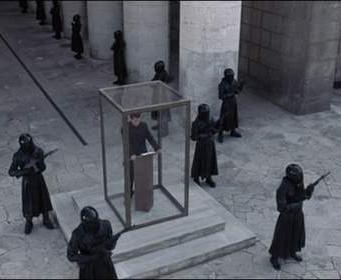Bow down before the one you serve
(Via Lew Rockwell 2008-05-09: Young Heretics vs. the Flag Religion.)
I spent my first few years of school in a Montessori co-op school with a large contingent of aging New Leftists and burned-out hippie types among the parents. But after that it was all government schools, and, as far as I can remember, every government school I ever attended started business each day with the Pledge of Allegiance. I started having problems with the Pledge around the time I got to junior high school; I didn’t like being expected to chant out one nation, under God,
and I figured it violated my religious liberty, so I stopped saying that. In high school I refused to say the Pledge of Allegiance at all, and I usually wouldn’t stand up, either, unless I felt like someone in the room was eyeing me. It’s not that I was trying to make some kind of anarchist protest; I was a fairly boring sort of Democratic Party-identified state Leftist for most of the time I was in high school, and didn’t become an anarchist until after I spent a couple years kicking around more radical forms of Leftism in college. But even then I considered the whole ritual Strength-Through-Unity exercise stifling and creepy, and I didn’t want to participate. So I feel a lot of personal, not just political, solidarity for these three teenagers in western Minnesota:
Three small-town eighth-graders were suspended for not standing at the start of the school day Thursday for the Pledge of Allegiance.
My son wasn’t being defiant against America,said Kim Dahl, mother of one of the students, Brandt, who attends Dilworth-Glyndon-Felton Junior High School in western Minnesota. She said her son offered no reason for sitting.Brandt told the Fargo Forum that Thursday’s one-day in-school suspension,
was kind of dumb because I didn’t do anything wrong. It should be the people’s choice.Kim Dahl said the
punishment didn’t fit the crime. If they wanted to know why he didn’t stand, they should’ve made him write a paper.
I understand the desire to try to protect your son from abuse in a case that’s sure to draw the howling attention of the Patriotic Correctness bellowing blowhard bully brigade. But, in all honesty, what would it matter if he were being defiant against America
? Everyone’s got the right their convictions and nobody should be forced to participate in theo-nationalist rituals that violate their conscience. I also understand the desire to try to get a lighter punishment for your kid when the school is so clearly throwing its weight around in an attempt to bully and intimidate through a heavy punishment. But, in all honesty, what possible justification could there be for forcing this kid to take on extra academic work or to explain himself any further than he cares to do so freely?
She said that Brandt has not been standing all year, and
all of a sudden it became an in-school suspension.The district today is defending the punishments. The school’s handbook says all students are required to stand but are not obligated to recite the pledge. The same is true for all four schools in the district, a school official said.
These three [students] didn’t, and they got caught,said Mel Olson, the district’s community education director. He said he backs the punishment,being a veteran and a United States of America citizen, absolutely.Olson served in the Marines in Japan during the Vietnam War.
Another thin-skinned Veteran Against Individual Freedom, I guess, who has nothing better to do with his time than rant and cry about how nobody gives the military and its obsessive flag protocol the respect
they allegedly deserve.
One of the things that makes me happy to see is that there is vigorous debate in the comments section on this story, with many posts from people who condemn the school’s actions (and the very idea of forcing children to recite a pledge of loyalty to the federal government on a daily basis), with reasonable argument and also, at times, with the ridicule and withering sarcasm that this asinine school administration deserves. The only thing there that’s irritating is the number of people who feel compelled to say things like, Oh, I think that everybody ought to jump up and shout
Whatever your personal views about flag protocol may be, this is an argument that can and should be made without doffing your hat to Patriotic Correctness.Sir, yes Sir!
when it comes time to say the Pledge, but I’m not sure that it’s really right to force people….
As for the commenters who have posted in defense of the school’s actions, they’ve offered three different sorts of arguments, each one of which is beneath contempt. In order of increasing outrageousness, here are some examples of each.
First, there’s the standard Patriotic Correctness argument, along with several direct invocations of love it or leave it,
some bizarre non sequiturs about caring about the Constitution (which is nowhere mentioned in the Pledge of Allegiance, has nothing to say about the Pledge or about flag protocol, and seems to mean absolutely nothing in the mouths of the people citing it except as a synecdoche for the authority of the United States federal government), and the usual long litany of demands for unearned respect in return for unasked-for services.
The idea here is that the kids ought to be punished for daring to hold, or at least to express, anything other than glassy-eyed unquestioning loyalty to the federal government of the United States of America:
Out of respect for our country..
Its really not that hard to stand up and show some respect- not merely for the flag, but for the values that the flag represents: liberty, justice, and truth. Yes, this is a free country, but that also means that these families are free to leave if they cannot respect our nation.
—olin157 @ 9 May 2008, 10:07 AM
And:
Snot Nosed Brats
These snot nosed brats should not only stand but they should gladly participate in the pledge. At a minimum they should obey the rules of the school which means get off you rear and stand. You don’t have to harm your little sensibilities by actually pledging allegiance to the only country you have, just stand up for goodness sake. The school was right, ACLU and these punks are legally wrong.
—seanintucson @ 9 May 2008, 12:21 PM
Not to mention:
Idol Worship?
Are you people serious? It has nothing to do with the sort. You are not
idolizinganything by standing up during the pledge. Hey, you don’t have to say it, the all powerful Supreme Court has brought thatcommandmentdown, if you will. Have we forgotten so soon what theStandardrepresents? Have youBaby-Boomersforgotten your parents who fought to raise that same flag during WWII? How about the current generation, your grandparents fought for it in WWII or Korea, parents in Vietnam and your friends now in Iraq and Afghanistan. I AM a current soldier, not retired, and HAVE served two tours in Baghdad. I truly believe you have the right to free speech, which is why you can go ahead and not say the pledge, but for the sake of my brethren who have fallen and those in the past who have died, show THEM the respect they deserve. Parents, you need to be teaching that this country isn’t about the government, but the people, and the people who formed it. This country’s freedom has, and is, constantly being paid for with the lives of its fighting men and women. While you may have the luxury of sitting back and saying its a free speech thing, just remember who gave you that same free speech.—SGT_M on May. 9, 08 at 12:26 PM
I should pause to note that my father was indeed in the Army in Vietnam, and my father’s father was in the Army in Korea. The claim that either my father, or my father’s father, fought for free speech, or this country’s freedom,
is absurd. Neither the North Korean government nor the North Vietnamese government, let alone the occupied countries of South Korea and South Vietnam, ever posed any threat to free speech or freedom in the United States of America. They did nothing in the Army to give me free speech
because freedom of speech in the U.S. was not at risk in the first place.
The claim that either my father or my grandfather fought to raise a damned flag on the other side of the world is also absurd. The reason that my father and his father were in the Army is because the federal government sent each of them a letter announcing that if he did not join the Army, he would be arrested and thrown in prison. I’ll be damned if I sit around and listen to some sanctimonious volunteer soldier talk about how the United States Army, which conscripted both my father and my grandfather against their will, deserves my respect
and gratitude for guarding individual freedom during the wars on Korea and Vietnam
As for the statement Parents, you need to be teaching that this country isn’t about the government, but the people, and the people who formed it,
I’m inclined to agree, but I think the upshot is not quite what SGT_M
takes the upshot to be. And I certainly don’t know what any of it has to do with standing during the Pledge of Allegiance. The Pledge of Allegiance is not about the country,
much less about the people;
it’s about loyalty to *the government*, and it says so right at the beginning:
I pledge allegiance to the flag of the United States of America.
And to the republic, for which it stands.
Anyway.
For the second argument, there’s the These snot-nosed punks got no respect
line. This is, honestly, even worse than the belligerent appeals to American theo-nationalism, because, as disgusting as the latter is, the former involves singling out harmless kids for sneering speculation on their motivations and character. And also because they are is no longer attacking a difference of view and an exercise of liberty because they think something more important (love of the government and its symbols, or whatever) overrides it, but rather attacking difference and liberty just as such, because these teenagers are acting like free human beings instead of doing as they’re told by the wise and powerful authorities. Thus:
Respect!
Even if you do not like the Pledge of Allegiance for what ever reason. You should respect others who care and stand! The lack of respect is the main part of our trouble in this rough times.
—hussman02 @ 9 May 2008 10:05AM
And:
If it’s a school rule and he
doesn’t have an answeras to why he didn’t stand – then he clearly is just being obstinate. I can’t believe a parent would support their kid in this situation!!!—Cartert1 @ 9 May 2008, 9:55 AM
And:
$10 says these are pain-in-the-rear kids with pain-in-the-rear parents that hover around their kids and never make any acknowledgment that their kids could ever do anything wrong. If these kids were formally and legitimately protesting the United States they should not have been punished, but the tenor of the article suggests they are just smart asses and that they did not have any political/personal convictions when they sat out the pledge.
—pipress1487 @ 9 May 2008, 10:23 AM
I don’t think that Brandt Dahl’s statement that I didn’t do anything wrong. It should be the people’s choice.
suggests they are just smart asses
without any political/personal convictions.
But suppose this were true. Then so what? Freedom of speech and expression don’t depend on you having something to say that fits some highly stylized model of formal and legitimate protest.
The chief value of freedom of association just is being able to be a lazy smart-ass and live your ordinary life as you see fit, rather than spending your time protesting and fighting an overbearing, invasive government. While the right to speak out against injustices is vitally important, what’s even more important, and in fact what makes the right to speak out against injustices as vitally important as it is, is the right to just be left the hell alone and not be subjected to the officious demands of busybodies and blowhards on your time and energy.
If these kids are just trying to be pains in the ass over a ritual that they find stupid and tiresome, I support them and salute them. I can think of no better reason to refuse to participate.
The third, and worst, of the arguments seems (surprisingly, for me, anyway) to be the most common: the idea that even if the school policy is unjustified, and even if schools oughtn’t force students to stand, and even if the kids have got a legitimate beef with the school board, it does not matter, because they broke The Rules, and you got to punish anybody who steps out of line, even if they had a perfectly good reason to object. Now it’s no longer a matter of attacking them for having the wrong beliefs about public political devotion, and no longer a matter of attacking them for being thoughtless or not following orders that the authorities had good reason to hand down. It’s a matter of attacking them for not subordinating their own considered judgment and obeying orders which are admittedly arbitrary and perhaps even wrong in themselves. (If you have some free time and a high tolerance for pain, feel free to count the number of times that people repeat, verbatim, the phrase rules are rules.
)
Thus:
he wasn’t protesting.
he didn’t have a reason why he didn’t stand, he just didn’t want to! what happens when mom and dad have house rules that he doesn’t want to follow? should they force him to follow their rules? life is full of rules that different people think are pointless, it just depends on whose ox is being gored. so now he’s learning that he doesn’t really need reasons for his actions, just whether he wants to do it or not. and we wonder why our youth have become so complacent today!
—K_Zemlicka @ 9 May 2008, 10:37 AM
And (all-caps is from the original):
RULES ARE MEANT TO BE FOLLOWED!
RULES ARE RULES, FOLLOWED THEM OR YOU’LL DEAL WITH CONSEQUENCES. BOTTOM LINE ! THAT CHILD DESERVED IT, I BETCHA HE’LL STAND NEXT TIME.
—securpo on 9 May 2008, 10:43 AM
Of course, there are two kinds of consequences
in this world. There are the natural consequences of an action, and then there are the artificial consequences that people attach to an action by their chosen responses. In this case the only natural consequence of not standing for the Pledge is getting to spend a minute longer sitting rather than standing. The consequences
that these three teenagers are being forced to deal with
are better described as the choice of school administrators to flip out and try to make teenagers suffer in the name of Old Glory. In any case, statist logic aside, the fact that school administrators flip out when you don’t obey this stupid policy can hardly be used as a justification for their flipping out, without making your argument do doughnuts around the parking lot.
And then there’s this:
I find it interesting that the school has a policy that students must stand during the Pledge. But, policy is policy and rules are rules, so I agree that the students should be punished. I do think it’s an anti-patriotic policy though and standing for the Pledge would be made more meaningful if kids are allowed to do it through free will.
—ttepley @ 9 May 2008, 10:28 AM
In other words, God forbid that anyone should sit down when there are rules to be followed. Students should be punished for refusing to co-operate with a policy which you yourself believe to be foolish and wrong, because rules and authority need no rational justification, and indeed can defy any rational justification, and they ought to be obeyed nevertheless.
And then there’s this:
My son wasn’t being defiant against America
YetMy son wasn’t being defiant against America,said Kim Dahl, mother of one of the students, Brandt, who attends Dilworth-Glyndon-Felton Junior High School in western Minnesota.The school’s handbook says all students are required to stand but are not obligated to recite the pledge.So her son wasn’t being defiant against America, but defiant to the school policy itself. Ignorance is not a justifiable defense.—pizann0 9 May 2008, 12:12 PM
I can’t stand flag creeps. I think that kind of belligerent theo-nationalism is absurd, contemptible, and dangerous. But what’s even worse than those who believe that every individual conscience should be turned towards a servile worship of the State, are those who believe that whatever your individual conscience is turned towards, you damn well ought to ignore it and follow the rules, because being defiant
to authority is itself a mortal sin, whatever that authority may be and however pointless or wrong may be the rules
that they are trying to impose. Where the complaint is not that they ought to be worshipping the one true God, but rather that they had damn well better bow down, no matter what may be before them at the altar.
Incidentally, the state ACLU says that punishing these students is against the rules, as set out in the U.S. Constitution and in rulings by the Supreme Court. I don’t care, and neither should anybody else.



